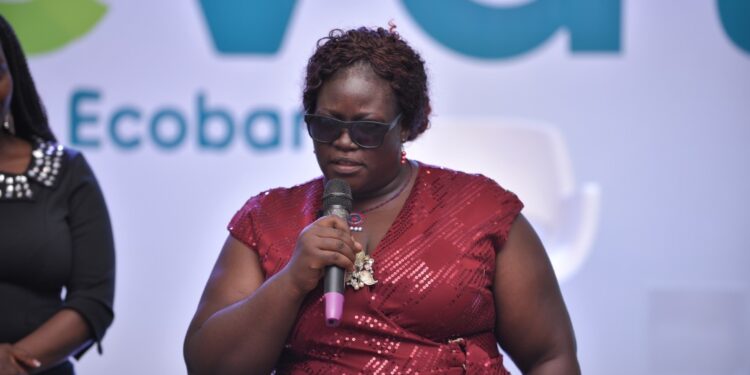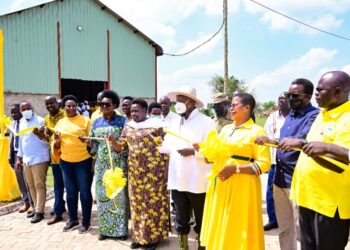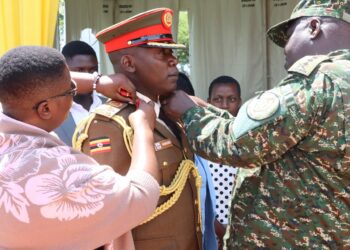By Deus Bugembe
A small walkway through the Buganda Road Craft Village leads to a number of shops selling different artistic products. Among these shops is a pair labelled 47 and 48 where a young girl and her mother run a business. On approaching the entrance of shop 47 with salutations , an affable voice calls out asking “ Is that Mr. Deus,” . It is the voice of Ritah Kivumbi Namayanja , a blind visual artist who has had to go about the craft without sight for thirteen years now.
It is hard to process how a blind individual has found a haven in art despite it being a skill that entails vision as a key aspect. Kivumbi’s love for art was a joy ride with her own organisation, Magezi Arts Exhibition Centre, which she started on September 22, 2008. It was all going well until tragedy struck.
“ I lost my sight a month after starting my own establishment, “ recalls Kivumbi who speaks while sitted, facing your writer. Her beautiful eyes light up the room, unfortunately they cannot be put to use. “ It dawned on me that my dream of promoting visual art was dying but not me,” she says.
Falling in love with art
Everyone’s passion for something has a breeding place. For Kivumbi, it stems all the way back to childhood. As a jovial teen, she was full of life and loved fashion and colours.
“ I always asked myself a day before which dress I was to wear the next day, the selection mostly had to do with the colours of the dresses,” she says.
What started as an innocent love for art manifesting through fashion would later transform Kivumbi’s life into something else. After graduating with her first bachelors with honors in development studies in 2002, she looked forward to life after school. Like any fresh graduate, Kivumbi set herself on course to look for a job and embrace life as an adult. The search got frustrating as it yielded no results day after day, forcing Kivumbi to look for something within herself. The voice of the little girl in her awakened the art and fashion consciousness.
“ I looked through my closet and realised I had many outfits. I started using them to type crotchets threads, I could do wall hangings, print on clothes , I could sew,” she says. But before all this, Kivumbi identifies an incident that could have sparked her art journey. It was her first visit to an art gallery.
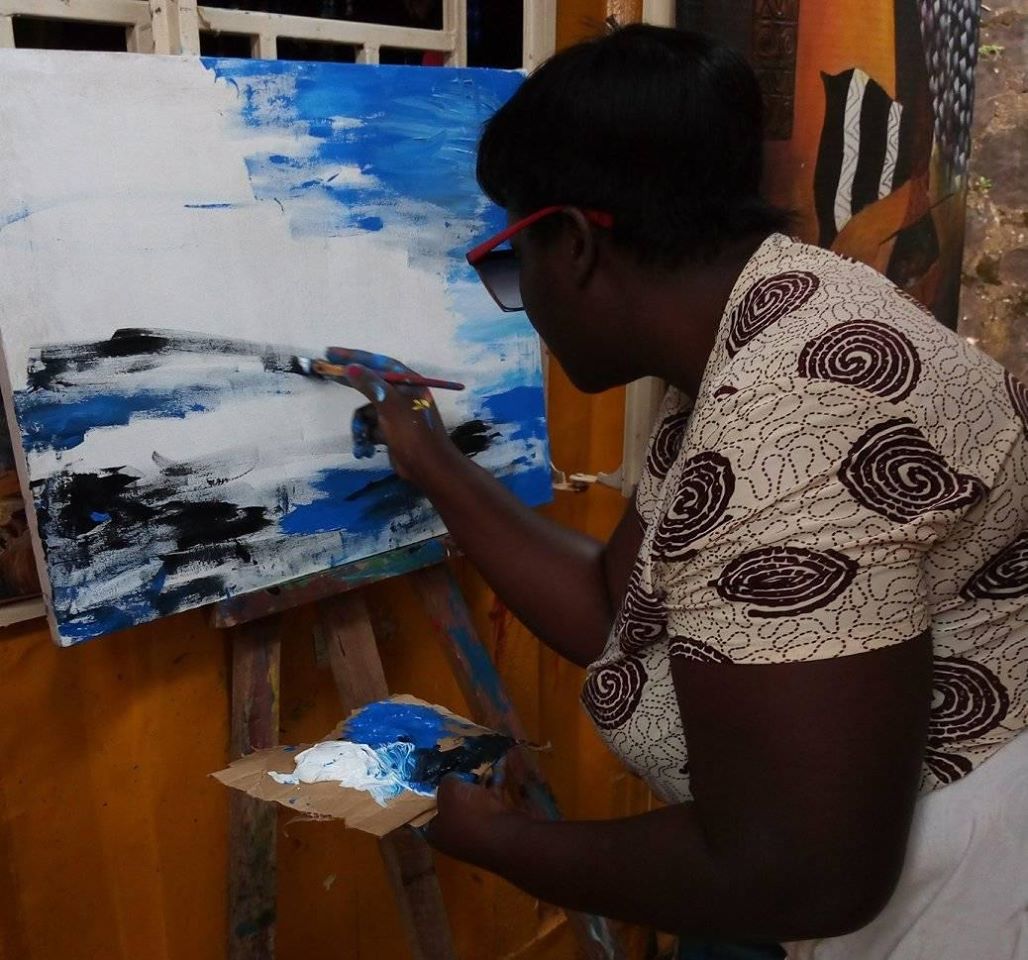
“ I remember visiting an art gallery in Kabusu during my A level. It was run and owned by a professor called Nagenda and I fell in love with what I saw,” she remembers.
Little did she know that all the artwork in there was handmade. That made her believe she could one day give art a shot. The memories and experience from her trip to professor Nagenda’s gallery pushed her to join the Makerere University Art Gallery after all she had no job after graduating.
Luck struck for Kivumbi when she found out that the gallery needed a programmes coordinator and as development worker with a bachelors in development studies, she was built for the role. She applied and got the nod, it was the beginning of another adventurous chapter of her life.
“ Coming into the gallery as a development worker and project manager, I had to learn art,” she says.
Kivumbi took on the mantle of studying art with conviction. She went back to school and had a masters in ethics and public management at the end of the day to show for.
“ I knew it would help me pull off successful art exhibitions, sculptures, ceramics and pretty much almost everything to do with art too,” narrates Kivumbi.
Losing sight.
The year 2008 is very significant in Kivumbi’s life, it had a cocktail of events that ranged from opening her own arts gallery to losing sight and it all happened in a space of 30 days. Kivumbi was living her dream as a curator makerere, organising and overseeing art exhibitions when sight woes kicked in a day after being part of a successful Uganda sculpture exhibition in November 2008.
“One day I got a headache which went on for two weeks, I started getting pain in the neck and it got stiff and medica checked for everything but could only end up with inconclusive results,” she recalls in a low tone. By this time, her eyes were popping out and her left hand was tingling as if it was a stroke. All this came with confusion for Kivumbi who thought she was so young to be going through this unknown health condition. It had robbed her of her livelihood, this bubbly and lively girl whose role was to promote art and encourage art students who joined the university, was no more with endless trips aided by her employers to different hospitals. She had no idea the worst was to come.
“A month later I realised my lids moved up as I looked in the mirror and I couldn’t see well yet I had no history of eye problems,” says Kivumbi, whose world was about to come crashing down.
Medics could not figure out what was happening to her after multiple tests and lumbar punctures were done (During a lumbar puncture, a needle is inserted between two lumbar bones (vertebrae) to remove a sample of cerebrospinal fluid). “ I was then told I was going to lose my sight, , I screamed in disbelief but quickly composed myself,” she says and with time she could see no more, her optic nerve had become dysfunctional and the doctors could not save her after they had no clue on what was going on.
Picking up the pieces
On receiving the terrible news of losing her sight, Kivumbi needed a way out but she knew it was never going to be easy. She first dealt with blindness by hiding and shutting her ears whenever the news came on. With time, she realised life had to go on without sight whether she wanted or not.
“ I started surrounding myself with positive messages through listening to radio ( Spirit fm). I also listened to pastor Joel Osteen and other audio material I was given,” she recalls.
This put her through the dark times and with time she started embracing her new life. Talking to another blind person ‘uncle Benon’ did wonders as he encouraged her everyday that she could still do something for herself despite being blind. The University students she had been training and encouraging also regularly visited her at home and helped rebuild her confidence.
She never stopped advising them on art even during the visits. The fact that they kept coming made her believe that if they could come for her advice and it turned out good, then she could also do what they were doing once again. It would take her six years after going blind to get her hands dirty with art again.
“ I had to come out and do what I love. I started with the jewellery ( stretches out arm , asks her daughter to bring her the jewellery). One thing led to another, after some time I started painting again,” she says.
By 2015, Kivumbi felt she was in a good place and ready to resume art but with a number of questions.
“ Where was I going to start from? I needed capital,” she asked herself. At the time, her first born daughter called Amazing Grace Kirabo was four. She is also the only of her three children she has seen. The other two found her blind. Kirabo was about to play a major role in getting her mother back up and running in the arts business. “ I started teaching my baby girl about art and we kicked it off with jewellery, then paintings,” she says before talking of using the law of thirds ( a gambling game based on the mathematical fact that, after a set number of spins, certain numbers will not have appeared). With that, she could see what was in her background. “ I started splashing paint all over the canvas, people around me helped me and with time I was doing some work,” she says.
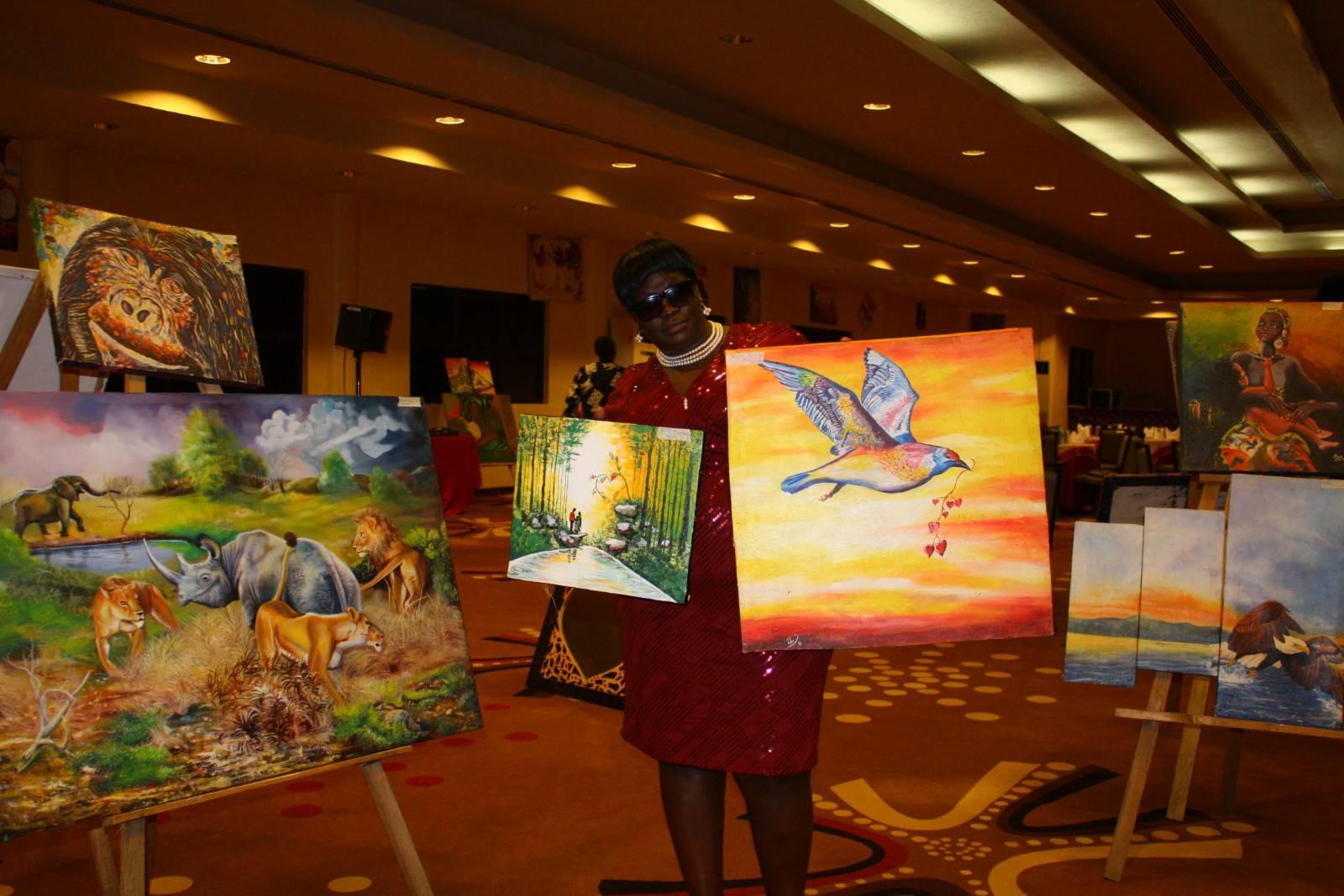
How does a blind person paint?
“When we are painting we use primary colours black, yellow, red. I will mark them with masking tape with the help of an interpreter and spread them . So in my mind I know where I have placed the primary colours. It helps me blend to get secondary colours, then I ask my interpreter if I’m on the right track,” she explains before revealing that she does abstract painting while on her own.
Abstract art is art that does not attempt to represent an accurate depiction of a visual reality but instead uses shapes, colours, forms and gestural marks to achieve its effect. It has no rules. She immediately asks her daughter to show one of her abstract pieces which is enthralling as they come. Abstract paintings are so special that the blind can touch the surface and tell what has been painted. It could be a mountain or anything else.
Thirteen years after going blind, Kivumbi is revelling in her role as Arts director (founder) and curator at Magezi Arts Exhibition centre, a registered non government organisation located at Namirembe Guest House next to the cathedral. It deals with visual arts while conducting community outreach programs and training. “ We train both able and disabled people in art to earn a living. Its ceramics, drawings, paintings, sculptures, printmaking, design, crafts, photography, filmmaking and architecture,” she spills.
Kivumbi who is part of the Business network international (BNI) art industry and also a member of the Arts Circle International, has already registered some highlights this year. On March 12, blind people came from all over the country as the Magezi Arts Exhibition held a session that acted as therapy on top of equipping them with skills, thanks to the Rubaga Rotary Club. Away from that, she has introduced the art weekend programmes. “I have so far done three of them Namirembe, on March 26 local and international scene , then corporates who have never painted before but have thoughts, there are many people out there that don’t know they can paint. We have made them paint,” she explains. At just shs 50,000, one can enjoy a painting session and take whatever they have painted home. These happen every weekend at Namirembe Guest House and other venues.
Challenges
Being blind takes away a lot from one. For Kivumbi, she has to deal with double expenses at all times. When moving, she has to pay for a guide and hire an interpreter. “The cost is high yet we earn and spend from the same market like everyone else . Government should restock for the blind because we also contribute to the economy. As a blind person we do double, there is no way out. Others have family around them while others run away,” she cries out loud.
She is also of the view that local people do not appreciate hand art. They don’t know that hand made paintings last forever. “Peter Picaso, Leonardo Davinci, Michael D’Angelo are pieces that still exist because they are handmade. If our people can appreciate art they will increase income for artists. Some artists have become lazy by printing instead of painting or using hands,” she
Kivumbi’s message to the blind out there “ first of all this is one of the biggest disabilities. Being visually impared is so tough. But you have your hands, can breathe, do whatever you can. If its hairstyling go for it, singing go for it. There are people out there ready to encourage you . Get up and get income instead of begging. I have an arts gallery in Namirembe and a crafts shop in town, it is not easy but you have to come out because people only help one who has started something. Today as a blind person, someone can give you money but they won’t do it everyday, you have to get going yourself. It’s better you have your own thing than waiting for help. Your mindset should be you are alive and able.”
Do you have a story in your community or an opinion to share with us: Email us at editorial@watchdoguganda.com


